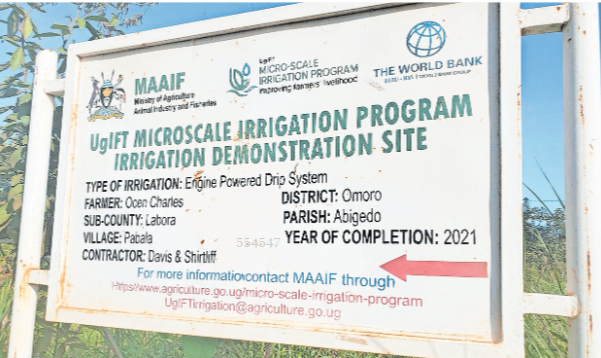Delays, corruption hinder irrigation efforts in northern Uganda

A sign post leading to Mr Charles Ocen’s UgIFT demonstration site in Labora Sub- County, Omoro District. PHOTO | JESUS OKELLO OJARA
What you need to know:
- The initiative was seen as critical to uplifting rural farmers and protecting them from the ravages of climate change.
In the lush agricultural landscape of Northern Uganda, irrigation has long been seen as a lifeline for farmers facing increasingly erratic rainfall patterns.
Under the Intergovernmental Fiscal Transfers Programme (UgIFT), the government introduced micro-scale irrigation projects to boost agricultural productivity and enhance food security. The initiative was seen as critical to uplifting rural farmers and protecting them from the ravages of climate change.
However, several years into the micro-scale projects, the results have been far from satisfactory.
Mr Patrick Olanya, a resident of Lagwayi Village, Pader Town Council in Pader District, said the projects were envisioned to empower them as smallholder farmers with affordable irrigation technologies.
However, he says, they have become a symbol of unfulfilled promises. “One of the issues troubling the micro-scale irrigation projects is the inconsistent flow of funds from the central government. The delays, coupled with allocation of insufficient funds, severely affected the projects,” Mr Olanya said.
This was witnessed when Pader District returned to the treasury Shs371.9 million allocated for the irrigation project.
Mr Patrick Obua, the councillor of Puranga Sub-county, Pader District, explained that the central government’s involvement in awarding the contract led to delays that ultimately caused the funds to remain unused.
“The bureaucratic inefficiencies within the central government often caused severe delays; the Ministry of Finance, which is responsible for coordinating fund transfers, sometimes does not release funds on time and this led to delays,” Mr Obua said.
On the other hand, Mr Vincent Obutu, the Acholibur Town Council councillor, said corruption has also marred the micro-scale irrigation projects.
“It is extremely disheartening that such a substantial amount of money has been returned to the treasury without serving its intended purpose. This situation raises concerns about possible inefficiencies,” Mr Obutu said.
Mr Simon Okello, another smallholder farmer from Bongtiko Sub-county, said he has been investing in preparing the land for the irrigation system but due to delays from the local government, he is still reliant on rain-fed agriculture.
“The lack of proper mobilisation and sensitisation meant that many smallholder farmers were unaware of the project and its benefits. If we were adequately informed, more people would have participated,” Mr Okello explained.
Mr Philips Acaye, the Pader District Micro-Scale Irrigation focal person, said the programme began well. “We started well, farmers were required to co-fund the equipment; 20 percent for solar-powered systems and 75 percent for generator-powered systems, which to our rural smallholder farmers, is quite expensive,” Mr Acaye said.
“By the end of the 2023/24 financial year, only 35 farmers had shown interest, with just 7 farmers completing their payments,” he added.
Mr Acaye further explained that the most critical misstep in the design of the micro-scale irrigation projects was the failure to take local context into account. He said the irrigation technology was not suited to some geographical and hydrological conditions.
“In many rural areas, the drip irrigation systems were set up in places with inadequate water sources, rendering them ineffective and the one size fits all approach failed to recognise the diversity of northern Uganda’s agricultural landscapes, resulting in low uptake,” Mr Acaye explained.
In Omoro District, Mr Charles Ocen, a farmer in Labora Sub- County, said he was supported by the government to set up a demonstration site under the UgIFT project in 2021. “I was given total costs by the government; I did not pay because this one was given as a demonstration site for farmers to come and learn drip irrigation,” he said.
Mr Ocen further noted that he had signed a Memorandum of Understanding with the district to offer his land for three years as a demonstration site but fewer farmers who are mainly being supported by NGOs had shown interest to learn about drip irrigation.
He said he is currently running the project using his resources since farmers who come to learn from him do not pay. “Most farmers who come here to learn, either have their private irrigation systems or are supported by NGOs, I have not seen a farmer under UgIFT coming to learn from my demonstration site,” he said.




